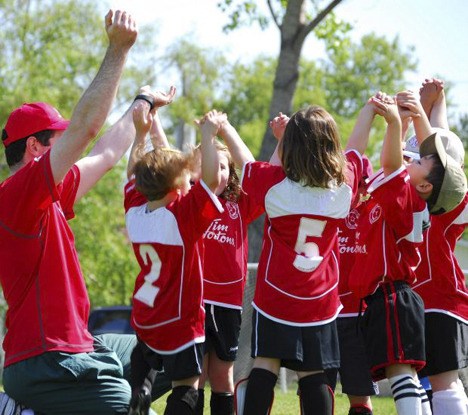Sports can have a profound and positive impact on our youth, but only if those of us who work with young athletes craft programs that foster participation, embrace long-term learning and reward effort — even into the teen years.
To keep kids interested and enjoying themselves in sports, coaches, parents and fans must embrace an ethic of inclusion, offering them lots of safe playing time and opportunities to play many sports and all positions.
These are important endeavors: Sports provide substantial opportunities for children’s cognitive, emotional and physical development. During the earliest years — and if done correctly — children learn to take risks and succeed and fail in supportive and instructive settings.
Young players — those between the ages of 5 and 9 — need lots of playing time to run around and have fun while developing basic motor skills, such as balance, kicking and catching. They also need a safe place to play, to give them the room they need to think imaginatively and create solutions to challenges.
While older children generally have increased pa-tience and capacity for complicated strategies, younger kids simply must play and engage in action. At this stage, they’re still learning to play cooperatively and aren’t able to incorporate complex game plans.
Because long verbal directives can confuse or frustrate young athletes, instructions and criticisms must be short and specific. Coaches and parents must not scream or berate players. Language is powerful. Yelling at a child may intimidate her, but it will not model effective problem-solving behavior. The words a child learns to explain the world to herself will influence her ability to master new material.
Successful approaches teach that a child can master skills through practice and play. Coaches must show that repetition and hard work — things a child can control — yield results.
In this way children learn to associate effort with success, not simply with winning. Coaches need to show children how to grasp and build skills incrementally and show that a tactical change can change outcome.
In order to get good at something, children need many opportunities to make and correct errors, creating solutions to problems in real time — a process that makes improvement possible.
Advances in scientific imaging show that intensive programs can cause measurable changes in brain structure, making neurotransmissions faster and stronger. Struggling, says award-winning author Daniel Coyle in his book “The Talent Code,” is not something to get past; rather, it is how we learn.
Sports give adults many opportunities to teach children how to deal with errors as part of a normal process, so they can appreciate and learn from the work they’ve done and use the hard-won information that mistakes contain. This helps build resiliency, the ability to use mistakes to move forward.
A win-at-all-costs mentality stifles opportunities for children to come up with creative solutions. If kids believe sports are primarily about the final score, they learn to view loss as negative and to fear taking risks — which will hurt them in the long-run, since risk is necessary to win.
Too much pressure from adults can make sports feel like an obligation. Pushing too hard can do away with a child’s motivation to play. A large percentage of kids drop out of sports in early adolescence, citing that sports stopped being fun.
Studies show that kids involved in sports form stronger ties with their communities and peers, do better in school and develop skills, fitness habits and interests that can last throughout their lives.
In the peewee and early years, successful coaches must reinforce participation and effort as well as achievement and competition. Kids need many chances to make errors and create solutions to problems in real time. Early on kids should not specialize and need to try many different sports and a wide range of positions – creating well-rounded and more flexible athletes down the road. During the earliest years, with the help of attentive adults, children develop the foundations upon which future learning occurs.
— Marie Py is a soccer mom.



